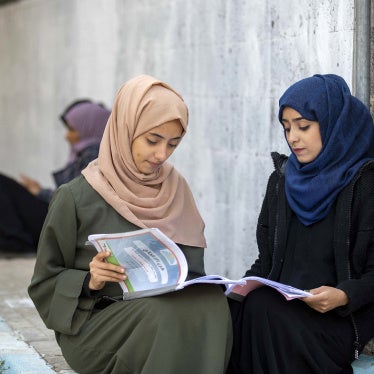“I would wake up to start cooking, then cleaning, washing clothes, and then cooking again. No rest, there was just no rest… Because she kept yelling, I cried and asked to go back to [the recruitment] agency, but madam said ‘I already bought you.’”
This is how Farah S., a 23-year-old Indonesian domestic worker in Dubai (whose name we have changed for her security) described her typical working day to me. Before she fled her employer, she said, she had to work for a household of 20 people for 21 hours a day, with no rest or day off. Her employer never paid her for the three months that she worked before she left her job.
The kafala visa-sponsorship system that is widely, though not uniformly, used across the Gulf bars most migrant domestic workers from moving to a new job before their original contract ends without their employer’s consent, trapping many in abusive situations. The kafala combined with inadequate labor law protections, create conditions ripe for exploitation and abuse of domestic workers.
Many migrant domestic workers like Farah hoped that this year’s International Migrants Day they would celebrate the introduction of long overdue labor reforms in the Gulf. On November 25, news media reported that the Gulf Cooperation Council had agreed on a new standard contract for domestic workers that would impose an 8-hour limit on their working day, give them one day off each week, and entitle them to overtime compensation, paid annual leave, and allow them to live independently from their employers.
The news reports cited an announcement by the head of Kuwait’s Public Manpower Authority, Jamal al-Dossari, following a Gulf Cooperation Council Labor Ministers’ meeting, and appeared to signal the start of a new era. Until now, the region’s estimated 2.4 million migrant domestic workers have received little or no protection under local labor laws, and many have faced a wide range of abuses, including unpaid wages, confiscation of passports, physical abuse, and forced labor.
Yet, workers are now wondering if these reports were true, or whether the announcement was simply a public relations exercise.
The Gulf Cooperation Council has neither published nor shared the new contract, and insider sources who do not wish to be identified claim that labor ministers attending the meeting discussed the proposed contract only briefly and without concluding an agreement. Instead, it appears that they have now returned to their home countries to check whether their governments agree on the model Gulf-wide contract and its provisions.
Far-reaching reforms are long overdue and urgent. Domestic workers in the Gulf need clear, strong, and enforceable contracts now—not at some indeterminate point in the future. And given the abuses Human Rights Watch has documented, they need to see guarantees written into the Gulf countries’ labor and immigration laws to protect their rights.
Labor laws in Gulf states partially or completely exclude domestic workers. Qatar, the UAE, Kuwait, and Oman exclude domestic workers from their labor laws completely. Bahrain’s 2012 labor law affords domestic workers annual vacations and access to mediation in labor disputes—but it fails to provide other basic protections, such as weekly rest days, a minimum wage, and any limits on working hours.
Saudi Arabia adopted a regulation in July 2013 that grants domestic workers nine hours of rest in every 24, with one day off a week, and one month of paid vacation after two years. But domestic workers can be required to work up to 15 hours a day, whereas the labor law limits other workers to eight hours of work daily.
In the week leading up to the Gulf labor ministers meeting, 90 organizations, including human rights and domestic workers groups, and trade unions joined together to urge governments to provide better protection of migrant workers, particularly domestic workers. The groups called on them to commit to key labor and immigration reforms that conform to the standards set out in the 2011 International Labour Organization’s (ILO) Domestic Workers Convention. The Convention requires states to extend equal labor law protections to domestic workers; adopt measures on labor inspection and to ensure enforcement; and establish effective, accessible complaint mechanisms.
A Gulf-wide standard contract along the lines suggested by the recent announcement would be no substitute for the law reforms that are needed, but it would represent a real improvement over the status quo and a good starting point for more fundamental change. As a first step, Gulf labor ministers should publish the draft contract and actively invite feedback from the public and key stakeholders - particularly domestic workers, but also the ILO, and governments of the labor supply countries. And they must initiate reforms to the labor law and kafala system.
It is not enough for Gulf labor ministers to tout contract reforms for domestic workers and then fail to deliver. Workers deserve more than false promises and public relations stunts. They need concrete changes that promote safe, fair, and dignified work. And they need them now.









